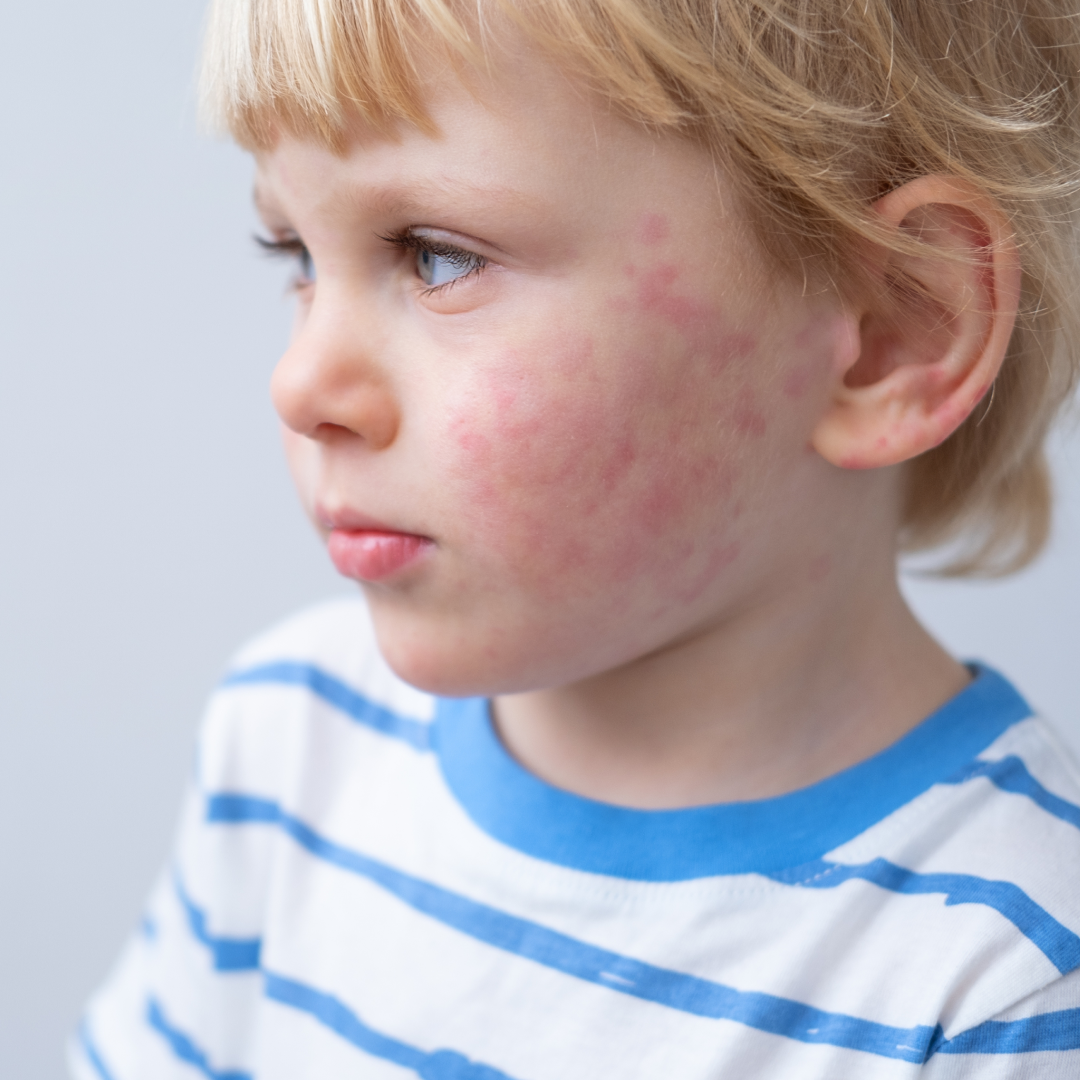
The source of your child's skin problems could lie in their gut
Millions of young children suffer from sensitive skin & eczema.
An imbalance in the gut microbiome has proven to impact skin health in ways not previously known. With Alba's simple test you'll get valuable insight about your child's gut microbiome – and a clean-cut action plan to prevent skin problems.
Learn more

A healthy gut supports healthy skin
The skin and gut microbiomes are made up of microbes that live on your child’s skin and in their gut. Both are crucial for skin health and can influence the risk of developing eczema.
If you’ve tried addressing your child's skin rashes or eczema with creams but it doesn't help, their gut microbiome might be the key.

Developed by scientists from Karolinska, KTH and Uppsala University
You're not alone. Our gut health test has helped many parents with their child's eczema.
Eczema is tough for both children and parents. Let Alba help you find the root cause of your child’s eczema and gain expert advice tailored to their needs.



FROM A PARENT
“Within a few weeks his eczema was completely cleared.”
"The great thing about Alba is that it’s based on science. You’re not guessing or relying on generic advice. The insights are personal, and the steps are easy to follow. We started diversifying Timo’s meals more and added yogurt, berries, and fermented foods. Within a few weeks, his eczema disappeared. Eight months later, it still hasn’t come back.”
– Noemie, Timo’s mom
FAQ
In children, it depends on the age. The baby's microbiome is constantly evolving from birth to adulthood, so monitoring its trajectory and development over time is even more informative than looking at only one snapshot.
From one microbiome test, you will discover:
- Levels of friendly bacteria, promoting healthy development
- Levels of unfriendly bacteria, as some types of bacteria are known to be unfriendly when in large share, being able to cause infections and inhibit friendly bacteria
- Gut microbiome diversity, which is associated to health and wellbeing
- Associations with constipation, from our clinical study in Sweden
- Levels of bacteria promoting immune system development and associated to lower risk of allergy and eczema
- Levels of bacteria promoting metabolic health and associated to healthy weight
- Levels of bacteria promoting brain health and cognition
- Most importantly, you will receive a set of personalized recommendations covering diet, environmental exposure, behavior and probiotic supplements (if needed) reviewed by our medical experts and discussed with you in a 1:1 consultation with a certified Nutrition & Health Coach. You will also receive 3 simple example recipes that promote optimal gut health.
References: Stewart CJ, Ajami NJ, O'Brien JL, Hutchinson DS, Smith DP, Wong MC, Ross MC, Lloyd RE, Doddapaneni H, Metcalf GA, Muzny D, Gibbs RA, Vatanen T, Huttenhower C, Xavier RJ, Rewers M, Hagopian W, Toppari J, Ziegler AG, She JX, Akolkar B, Lernmark A, Hyoty H, Vehik K, Krischer JP, Petrosino JF. Temporal development of the gut microbiome in early childhood from the TEDDY study. Nature (2018);
Eczema is more than just dry skin, it is a chronic, inflammatory skin condition. It qualifies as eczema if:
- The rash is persistent and recurring, often lasting weeks or longer.
- It is itchy(sometimes severely).
- It appears in typical areas, such as the face, scalp, hands, elbows, knees, or behind the ears.
- The skin becomes inflamed, red, scaly, or cracked, sometimes oozing or crusting in severe cases.
- It is triggered by irritants, allergens, weather changes, or stress.
A doctor can diagnose eczema based on symptoms and family history.
Food triggers vary between individuals, so it's best to track symptoms and consult a doctor if needed. But there are some general guidance:
- What foods are typically good for eczema: Foods rich in omega-3 fatty acids (like salmon, flaxseeds), antioxidants (fruits and vegetables), and probiotic food (yogurt, fermented foods) may help support skin health and reduce inflammation.
- What food can trigger eczema: While no food directly causes eczema, some children have food allergies (e.g., dairy, eggs, nuts, soy, wheat) that trigger or worsen flare-ups. Processed foods, high sugar intake, and artificial additives may also contribute to inflammation.
We are inhabited by 39 trillions of microorganisms that live on our skin, mouth, genitals, respiratory tract and gut. They are bacteria, fungi, viruses and parasites and they are essential for our health - in fact, we couldn’t survive without them! The gut microbiome is the collection of all of our microbes in the gut, and their DNA. It has a fundamental role in digestion, immune system health and brain health. Imbalances in the gut microbiome have been associated with most chronic diseases like obesity, diabetes, asthma, celiac disease and even cancer.
References: Ghosh, T.S., Shanahan, F. & O’Toole, P.W. The gut microbiome as a modulator of healthy ageing. Nat Rev Gastroenterol Hepatol (2022); Vijay, A., Valdes, A.M. Role of the gut microbiome in chronic diseases: a narrative review. Eur J Clin Nutr 76, 489–501 (2022).
From a stool sample, we are able to collect the DNA of all gut microbes. From their DNA we can tell exactly which bacteria are present and what they are doing in your gut. We analyze bacterial DNA only, and we do not analyze your own DNA.
More questions?
Contact us
